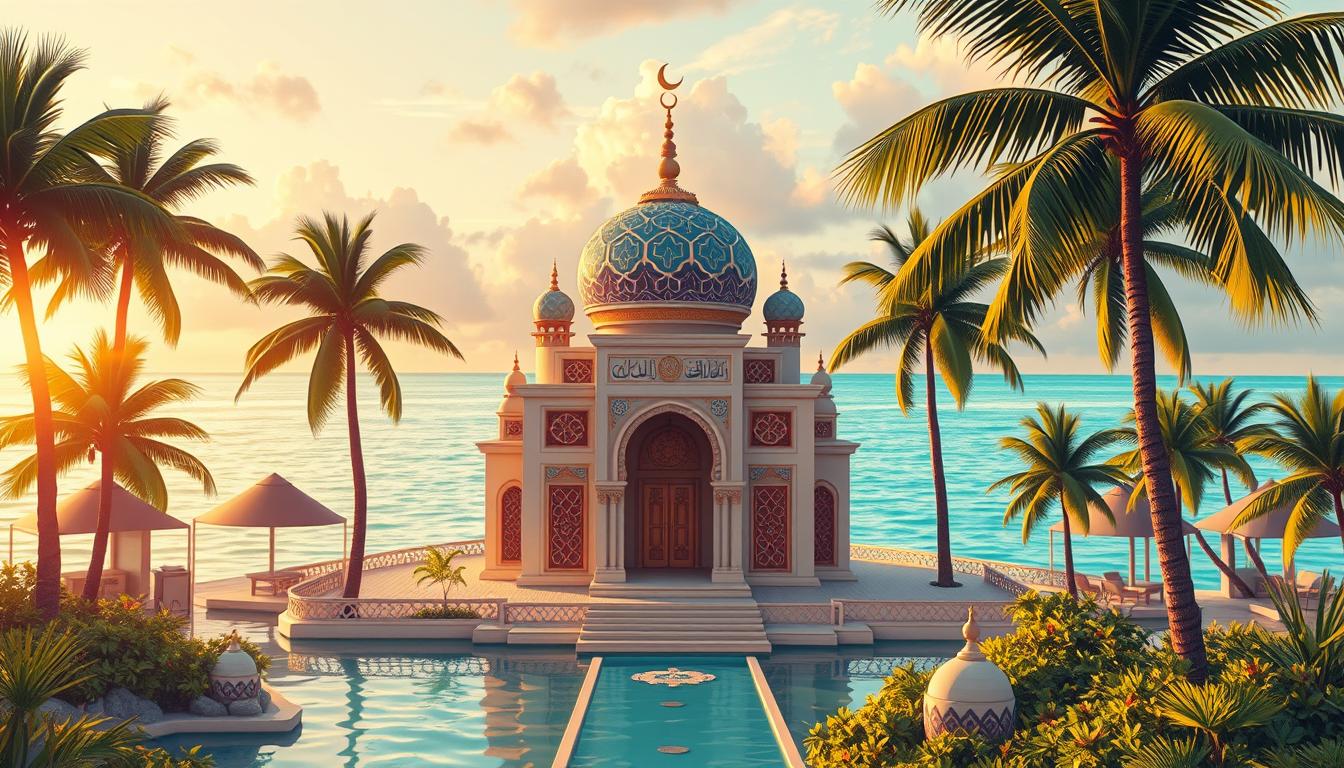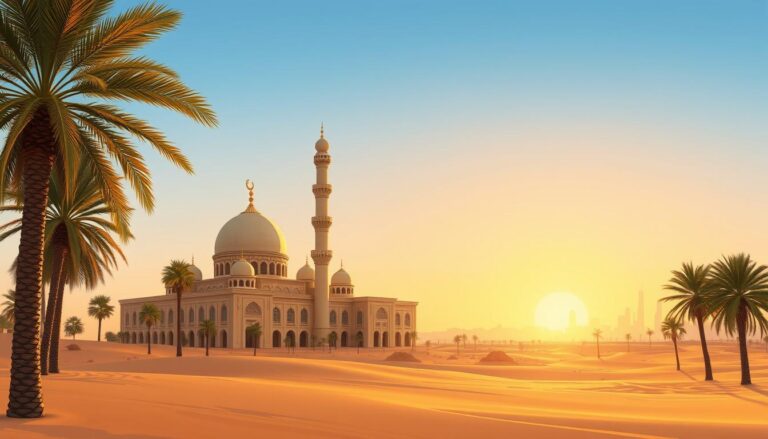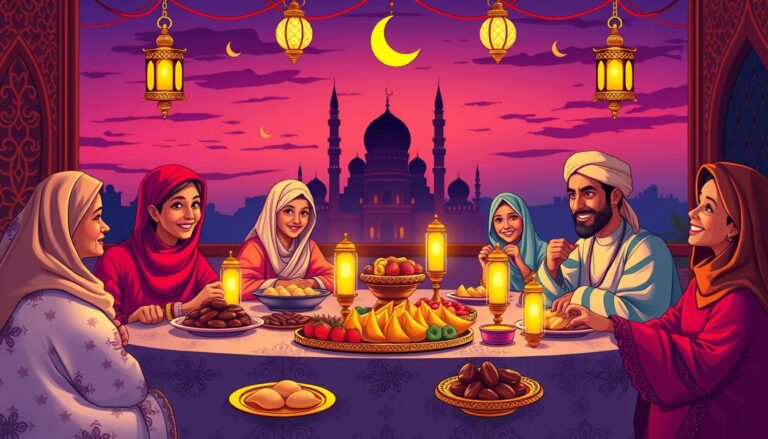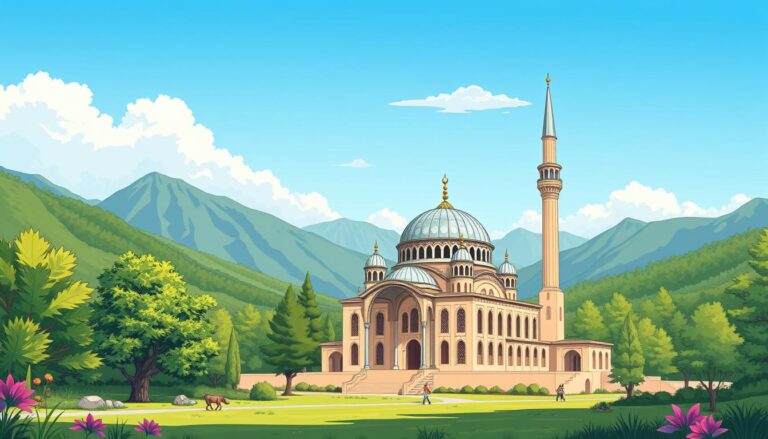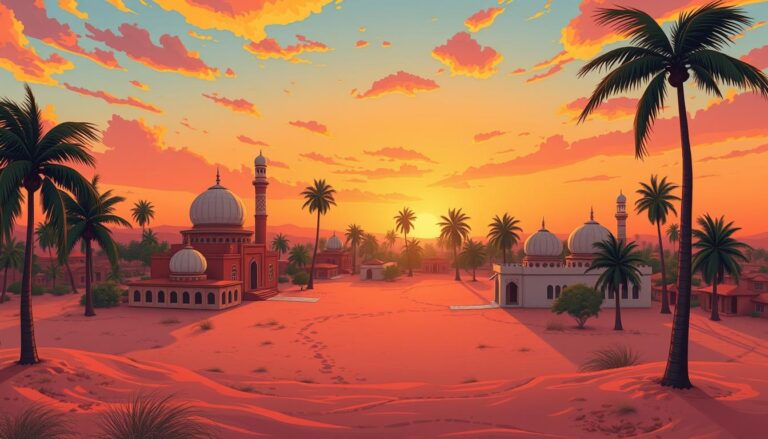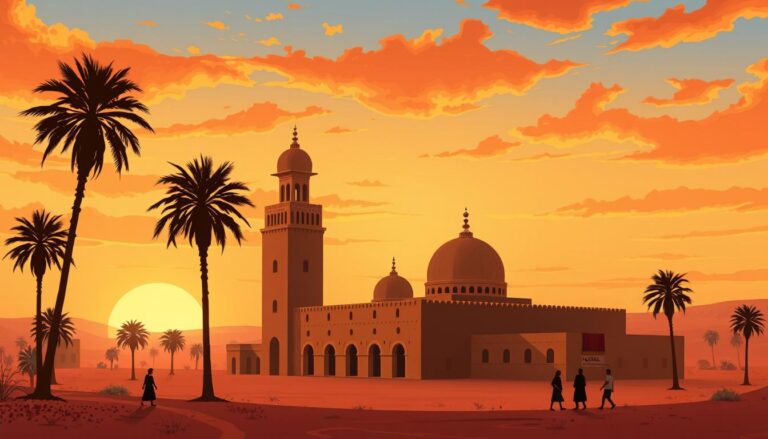Islam in the Maldives
The Maldives, a beautiful archipelago in the Indian Ocean, is deeply rooted in Islam. Over 98% of its people are Muslim, making it one of the most religiously unified countries. Islam has shaped the Maldivian culture and identity since the 12th century, when the last Buddhist king converted.
Since then, Islamic dynasties have ruled the Maldives. The 2008 Constitution makes Islamic law, or Shari’a, a key part of the country’s governance. This makes the Maldives a unique example of a modern, Islamic nation-state.
The Maldives’ rich Islamic heritage is seen in its culture, architecture, and religious sites. The country’s mosques and Islamic festivals show Islam’s strong presence. The Maldives is also a favorite tourist spot, especially for visitors from the Arab Gulf states and the Middle East.
The Predominance of Islam
Islam is the main religion in the Maldives, with over 98% of people being Sunni Muslims. The country’s constitution makes Islam the official religion. It’s a law that everyone must follow.
The Maldives is one of the most religiously uniform countries globally. In 2020, 98.69% of the population was Muslim. But, the government says the Maldives is 100% Muslim.
The influence of Sunni Islam is seen in the Maldives’ laws and social rules. Judges use Sharia law for many cases. Non-Muslims can’t bring in items like alcohol or pork.
The government’s strict stance on Sunni Islam limits religious freedom. The constitution says everyone must be Muslim. Changing religions can mean losing citizenship.
Despite being mostly Sunni, the Maldives has a diverse religious past. Archaeology shows the islands were once home to Buddhists. But, there have been times of religious intolerance and destruction of non-Islamic sites.
Historical Origins of Islam in the Maldives
The story of Islam’s arrival in the Maldives is quite interesting. It started in the 12th century. The last Buddhist king, Dhovemi, converted to Islam in 1153 AD. This was influenced by Arab merchants who traded in the Indian Ocean.
Influence of Arab Traders
Arab traders were very important in the Maldives. They came from the Middle East and Africa. They helped connect the Maldives to other cultures through trade.
Their interactions with locals helped the Maldivian king adopt Islam. This was a big change for the nation.
The Legend of Abu al-Barakat Yusuf al-Barbari
The story of Islam’s arrival in the Maldives is linked to Abu al-Barakat Yusuf al-Barbari. He was a Moroccan explorer and scholar. He’s said to have converted the king after defeating a sea monster called Rannamaari.
While the truth of this legend is debated, it’s very important. It shows why Arabic is key in Maldivian administration. It also explains why the Maliki school of Islamic law was adopted.
Islam spread in the Maldives over the next centuries. This led to six Islamic dynasties ruling for over 700 years until 1932. This period shaped the Maldives’ Islamic identity. It’s still a big part of Maldivian culture and society today.
Islam in the Maldives
The Maldives is deeply rooted in Islam. Sunni Islam is the state religion, required by law for all citizens. The country’s laws are based on Sharia law, which is Islamic.
Worshiping other faiths in public is banned. Spreading any religion other than Islam is a crime. Islamic practices and traditions are a big part of Maldivian life. Mosques are key places of worship, and Islamic holidays are national days.
“Islam is the state religion in the Maldives, with the constitution mandating that citizenship status is dependent on adherence to the Islamic faith.”
About 98.69% of the Maldives’ people are Muslim. The rest are mostly Christians, Hindus, and Agnostics. But, even the minority can practice their faiths privately. The government keeps the nation united in religion.
Mosques are everywhere in the Maldives. These traditional buildings are made of coral stone and thatched roofs. They are the heart of religious life and community events.
Legal Framework and Religious Unity
The Maldives’ constitution makes Islam the state religion. It’s a law that everyone must follow to be a citizen. The document says no laws can go against Islam’s teachings. It also lets the government limit rights to keep Islam safe.
The president and other leaders must follow Sunni Islam. This is written in the constitution.
Constitutional Provisions
The Maldives’ laws focus a lot on Islam. Some important points are:
- The Maldives is an Islamic state, and Islam is the state religion.
- No law contrary to any tenet of Islam can be enacted in the country.
- The government can restrict rights and freedoms to “protect and maintain the tenets of Islam.”
- The president and other public office holders must be followers of Sunni Islam.
- The propagation of any religion other than Islam is criminalized, with penalties ranging from fines to imprisonment.
These laws show the Maldives’ strong commitment to Islam. They help keep the country united under Islamic values.
“The constitution of the Maldives firmly establishes Islam as the state religion, making adherence to it a legal requirement for citizenship.”
Mosques and Islamic Architecture
Mosques in the Maldives are key to the country’s Islamic faith and culture. They show off the nation’s Islamic architecture with detailed designs and traditional building methods. The mosques are usually white, made of coral stone, and have roofs of corrugated iron or thatch.
The Malé Friday Mosque, also known as the Grand Friday Mosque, is a standout example of Maldivian Islamic architecture. Built in 1984 with help from the Persian Gulf states and Pakistan, it combines traditional Maldivian and modern Islamic styles.
The Maldives has many Maldivian mosques that display the country’s Islamic architecture and Maldives Islamic art. The Fandiyaru Mosque, built in 1586, is one of the oldest coral stone mosques. The Meedhoo Friday Mosque, from around 300 years ago, shows the fine craftsmanship and detail found in these buildings.
“The architecture in the Maldives has been influenced by various cultures including those from India, Sri Lanka, East Africa, Arabia, Persia, and the Malay Archipelago.”
Mosques in the Maldives are more than just places of worship. They are also symbols of the country’s rich cultural heritage. The mosques feature wood carvings, lacquered panels, and intricate mandalas on the ceilings, highlighting the skill of Maldivian artisans.
As the Maldives faces the threat of rising sea levels, saving these iconic Maldivian mosques and their Islamic architecture is vital. Efforts are being made to document and check the condition of these historic sites. The goal is to protect them for the future and share the Maldives’ remarkable Maldives Islamic art with the world.
Islamic Practices and Celebrations
The Maldives is deeply rooted in Islamic traditions. Mosques are the heart of religious and community life. The call to prayer, or adhan, is heard across the islands. The Mudhimu (Muezzin) calls the faithful to worship.
Most shops and offices close for 15 minutes after each prayer. This shows the country’s deep respect for Islamic practices.
The holy month of Maldives Ramadan is a significant Islamic observance. During this time, cafés and restaurants close during the day. Working hours are also limited as the nation fasts.
The month ends with the joyous Maldivian Islamic celebrations of Eid al-Fitr and Eid al-Adha. These are celebrated as national holidays. They show the country’s strong Islamic practices in Maldives.
- Nearly all Maldivians are Sunni Muslims of the Shafi school.
- Women in the Maldives are known for their piety, often praying five times a day and regularly reading the Quran.
- Maldivians were originally Buddhists and converted to Sunni Islam in the mid-12th century.
“The homogeneity of religion in the Maldives is preserved in part due to restrictions on land ownership and citizenship to Sunni Muslims.”
The Maldivian Islamic celebrations throughout the year are a testament to Islam’s central role. Festivals like Eid al-Fitr and Eid al-Adha bring communities together. Traditional music, dance, and food enhance the festive atmosphere, showing the Islamic practices in Maldives.
From the daily call to prayer to Ramadan and religious holidays, Islamic practices in Maldives shape the nation. They unite its people and define its identity.
Minority Religions and Restrictions
The Maldives is mostly Muslim, with over 98% following Sunni Islam. But, there are small groups of Christians, Buddhists, and Hindus too. Yet, practicing any religion other than Islam in public is banned, and non-Muslims cannot spread their faith.
Foreigners, like workers and tourists, can practice their faiths privately. But, they must respect the Islamic culture deeply rooted in Maldivian life. The government watches religious minorities closely, ready to act if they see a threat to unity.
The Maldivian constitution says the country is fully Muslim. Being a Maldivian citizen means you’re a Muslim. Those who leave Islam face serious penalties, like losing citizenship and being shunned by society.
Recently, the government has worked to strengthen the country’s Islamic identity. The Ministry of Islamic Affairs has started programs to teach more about Islam in schools and public places. Building places of worship for other religions is not allowed, and bringing in religious icons or statues is banned too.
International human rights groups have criticized the Maldives for its strict rules on religion. They urge more tolerance and inclusion for minority faiths. But, the government is firm in keeping the Maldives Islamic, and challenges for non-Muslims will likely continue.
“The Maldives is a nation of 1,000-plus islands that declares itself to be 100% Muslim. Being a citizen of the Maldives means being a Muslim due to the country’s adherence to Sharia (Islamic law).”
Despite the rules, some religious minorities in the Maldives find ways to practice their faiths quietly. Christians, for example, might worship in private homes. Buddhists and Hindus might follow their traditions at home too. But, they face constant monitoring and the risk of persecution.
In summary, the Maldives’ strong Islamic stance makes it hard for non-Muslims to practice their faiths openly. The government’s stance on religious freedom is under international watch. Yet, the Maldives’ identity as a Muslim-majority nation shapes its culture and politics deeply.
Challenges and Controversies
The Maldives is known for its beauty but faces many challenges. The strict Islamic laws and limits on other religions cause tension. These issues spark debates and controversies.
Online Hate Speech and Threats
Groups say people called “secularists” or “apostates” face online hate and threats. The authorities often do nothing. This makes many people feel scared and unsure, especially those with different views.
The government’s control over religion is also criticized. They require imams to use approved sermons. This has led to Maldives religious controversies and questions about the government’s role in Islam.
The challenges facing Islam in Maldives go beyond religious rules. Issues like women’s underrepresentation in parliament and criminalizing same-sex relations are also big problems. Climate change also affects the Maldivian people a lot.
The hate speech and threats against non-Muslims in Maldives make everyone feel uneasy. There are reports of extremism and radicalization. The government’s response is seen as not enough by many.
To solve these problems, the government, civil society, and religious leaders need to talk openly. They must find a way to respect the Maldives’ Islamic identity while protecting human rights and freedoms.
The Role of Islam in Maldivian Culture
Islam deeply influences Maldivian culture. The country’s laws and politics follow Sharia law. Islamic values are key to Maldivian identity.
Many mosques and Arabic as an official language show Islam’s importance. Islamic holidays are also very important.
In the Maldives, Islam is a big part of life. From mosques to religious festivals, Islam is everywhere. It shapes the country’s laws and daily life.
The Maldives’ culture is also shaped by Islamic traditions.
Traditional crafts and music show Islam’s impact.
“The Maldives’ adherence to Islamic values is a fundamental aspect of its national identity, shaping the country’s laws, customs, and way of life.”
Islam continues to play a big role in Maldivian culture. It keeps the country’s heritage alive. It also brings people together through shared beliefs.
Conclusion
The Maldives shows how deeply Islam shapes a nation’s identity and culture. It is one of the most religiously homogeneous countries, with Sunni Islam as its core. The Maldivian constitution highlights the importance of Islamic law.
The government controls religious affairs tightly. This ensures Islam remains the foundation of the nation’s laws and politics.
Despite challenges and controversies, Islam’s role in the Maldives is vital. The country’s traditions, architecture, and celebrations all tie back to Islam. As the Maldives moves forward, its Islamic identity and future are key to its growth.
In summary, the Maldives is a prime example of Islam’s impact on a nation. It shows how a country can balance tradition and modernity while staying deeply Islamic.
Source Links
- In the Maldives, an ominous rise in intolerant Islam
- Maldives – United States Department of State
- Maldives-Middle East Connections
- Freedom of religion in Maldives
- Religion in the Maldives | MaldivesGuide
- When the Maldives Embraced Islam: A Historical Journey
- Home
- A Short History of the Maldives
- Islam in Maldives
- Religion in the Maldives
- Maldives – United States Department of State
- MALDIVES 2020 INTERNATIONAL RELIGIOUS FREEDOM REPORT
- MALDIVES 2018 INTERNATIONAL RELIGIOUS FREEDOM REPORT
- The Maldives
- Coral Stone Mosques of Maldives
- Archaeological Investigations on the Coral Stone Mosques of the Maldives
- Koagannu Mosques and Cemetery
- RELIGION, FANDITA AND ISLAM IN THE MALDIVES
- Maldives Festivals – Major Festivals in Maldives
- No title found
- Maldives
- World Report 2023: Rights Trends in Maldives
- Trouble in Paradise: Endorsed Extremism and Sustained Extremist Ecosystems in the Maldives
- Does Islam have a problem with democracy? The case of the Maldives
- Maldives Culture: Language, Religion, Food
- Maldives – United States Department of State
- Radical Islam in the Maldives: Hotbed for al-Qa’ida and Islamic State
- Maldives

